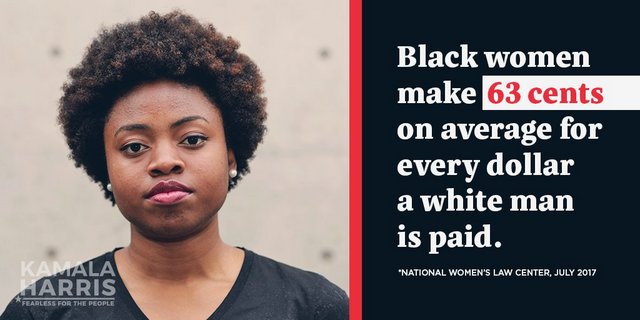[ad_1]
By Micha Green, AFRO Washington, D.C. Editor, [email protected]
Despite their inherent ability to balance businesses and babies, hair and homes, optimism and oppressors and maintain their magic, Black women are working harder and making less than their White counterparts in the workforce.
In 2018, the year of “Beychella” and America’s call for #Oprah2020, Black women must work an additional 200 days to make what their White male counterparts earn. This year, August 7, also known as “Black Women’s Equal Pay Day”, marks the point in the year where Black women have finally caught up to what their White male counterparts made the year before.

“Black women working full time, year-round are typically paid only 63 cents for every dollar paid to their white, non-Hispanic men counterparts “#BlackWomensEqualPay #DemandMore,” the National Women’s Law Center (NWLC), wrote on Twitter.
From 2-3 p.m. on the August 7, organizations and Black women from all around the country tweeted about the wage gap using the hashtags #BlackWomensEqualPay and #DemandMore.
“Equal Pay Day for All” happens in April, yet Black Women’s Equal Pay Day is celebrated in August because of the extent of the major wage gap between White employees and Black women- about 38 percent less than White men and 21 percent less than White women according to Lean In. “38 percent counts,” women emphatically said in a video released by Lean In in honor of Black Women’s Equal Pay Day.
Black women are paid 38% less than white men. I support equal pay—because #38PercentCounts. https://t.co/PrRg8U8HH7 #BlackWomensEqualPayDay pic.twitter.com/4ls4UVUsNt
— shonda rhimes (@shondarhimes) August 7, 2018
Not only is the wage gap a nasty symptom of the pervasive bias in the country, but also the gag is corporate America is cheating itself in cheating Black women out of their money. The gap facing Black women has widespread effects throughout the economy.
According to Forbes, 80 percent of Black mothers are primary breadwinners for their households. For a Black woman raising a family, closing the wage gap could mean “two-and-a-half years of child care, three years worth of groceries and roughly 22 more months of rent,” according to Forbes.
Despite the Black mothers’ struggles, without fair pay comes a domino effect of families living in poverty and overall less money to contribute to the economy.
“The research shows that women are key to the economic growth of our societies. Pay us equitably and watch how our economy grows,” Angela Guy, Senior Vice President, Diversity Inclusion for L’Oreal USA told Forbes.
There are 24.3 million Black women in the United States, making up 14 percent of all U.S. women and 52 percent of all African Americans. According to the Nielsen report, “African-American Women: Our Science, Her Magic” which highlighted the Black woman’s dollar, African American women are going to college at a steadily increasing rate, with 64 percent enrolling right out of high school and 23 percent over age 25 having a bachelor’s degree if not higher education.
With more education means more money to spend, one would think, and so marketers are now looking at how to target Black women.
“Black women have strong life-affirming values that spill over into everything they do. The celebration of their power and beauty is reflected in what they buy, watch and listen to, and people outside their communities find it inspiring,” said Cheryl Grace, senior vice president of U.S. Strategic Community Alliances and Consumer Engagement, Nielsen. “Understanding how Black women’s values affect their buying decisions has long been a marketing necessity. Now, marketers must also recognize the intercultural influence of Black women on the general market as an increasingly vital part of how all women see themselves, their families and the rest of the world.”
Nielsen found that Black women’s consumer and brand preferences drive total Black spending power up $1.5 trillion.
Thus the Black female dollar is critical and yet they’re the ones not making fair wages. In not paying Black women fairly, they are unable to contribute the amount of money they could to their communities and the overall American economy.
Guess what America? Un the great words of the philosopher, DJ Khaled, “Congratulations. You played yourself.”
[ad_2]
Source link

